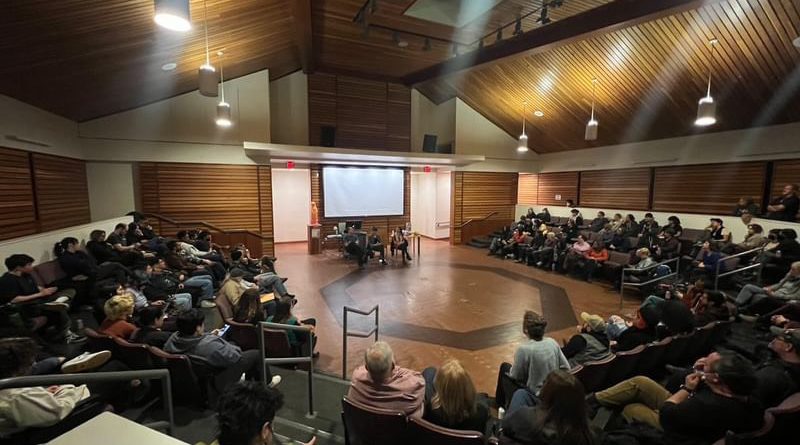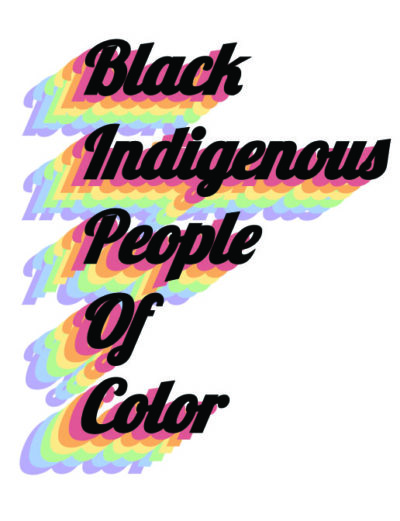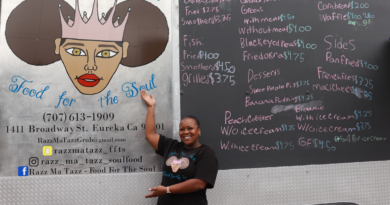“Roadmap to Apartheid” screening opens up the conversation about Palestine
by Georgina Munoz-Villanueva
Humboldt for Palestine, a humboldt-based community collective, hosted a screening of “Roadmap to Apartheid” and a panel discussion with its directors Ana Nogueira, Eron Davidson and local Palestinian organizer Jamilla on Jan 19 at the Native American Forum in Cal Poly. The event was originally going to be sponsored by the CRGS, NAS, Politics and Social Work departments but all except for the NAS department backed out of their sponsorship on Dec 24.
“Roadmap to Apartheid” is an award-winning documentary which juxtaposes film and experiences from both occupied Palestine and apartheid South Africa to highlight the ways in which the Israel occupation breaches international law by committing apartheid. The movie exemplifies these similarities through the presence of checkpoints, Jews and Whites only areas, color-coded ID systems and having people in the same neighborhood live under different laws.
Co-directors Eron Davidson, a Jewish Israeli, and Ana Noguiera, a white South African, met while Noguiera was a producer at Democracy Now!
“This is much bigger than apartheid,” Noguiera said. “As the South African lawyers and researchers brought [in the ICJ case against Israel]– it’s genocide.”
The UN defines the crime of apartheid as one with “similar policies and practices of racial segregation and discrimination” as in South Africa. Recently, South Africa took Israel to the Internation Court of Justice over the crime of genocide against Palestinians in the Gaza strip.
“Unfortunately this movie is very relevant,” said Davidson. “The land confiscation, forced removals, house regulations, kidnappings, etc. inside [Palestine] continue. The world has forgotten the people of Gaza for 17 years since the siege started, until October 7.”
Since the October 7 attacks on the Israel occupation and its more-than-100-day-long indiscriminate killing of Palestinians, the documentary has gained traction. The ongoing assault on the Gaza strip by the occupation has killed more than 24,000 Palestinian civilians, including more than 16,000 women and children.
“This movie helps explain what happened before October 7 and why,” Noguiera said.
The documentary provides context on the living situation Palestinians have endured for decades, from the withholding of basic necessities by the Israel occupation, to the destruction and displacement of their homes and homeland.
“I have never seen a documentary about my hometown and the struggle of my people as informative and real as this one,” said Abdul Akila, a plastic surgeon from Gaza who came to the screening after hearing about it at the Eureka Courthouse demonstration for a ceasefire. “It’s the best documentary I’ve ever watched. It gives you a touch of reality and what life was really like over there.”
Akila fled to Egypt on Oct 17. He had been in the US more than a decade ago as a part of an exchange program which allowed him to come back, and he talked about his own experiences in Gaza during the panel discussion.
“Where I was working I became like an undertaker, not a surgeon,” Akila said. “I buried more than 20 of my relatives over ten days, so the first chance I got to leave, I took it. I can’t receive any more relatives dying.”
Both Davidson and Noguiera wanted the film to be used as a way to teach about the Boycott, Divestment and Sanctions (BDS) movement, a Palestinian-led campaign that calls for “ending of the [Israeli] occupation […], and promoting the rights of Palestinian refugees to return to their homes and properties as stipulated in UN resolution 194.”
The panel discussion opened up the conversation about the BDS movement, intersectionality and how to move forward.
“We can’t have these conversations without talking about Palestine,” said local Palestinian organizer Jamilla.
The movie can be viewed in full for free on youtube.
Readers can find more information about upcoming events on Humboldt for Palestine’s instagram account: @humboldtforpalestine.




